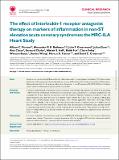Files in this item
The effect of interleukin-1 receptor antagonist therapy on markers of inflammation in non-ST elevation acute coronary syndromes : the MRC-ILA Heart Study
Item metadata
| dc.contributor.author | Morton, Allison C | |
| dc.contributor.author | Rothman, Alexander M K | |
| dc.contributor.author | Greenwood, John P. | |
| dc.contributor.author | Gunn, Julian | |
| dc.contributor.author | Chase, Alex | |
| dc.contributor.author | Clarke, Bernard | |
| dc.contributor.author | Hall, Alistair S | |
| dc.contributor.author | Fox, Keith | |
| dc.contributor.author | Foley, Claire | |
| dc.contributor.author | Banya, Winston | |
| dc.contributor.author | Wang, Duolao | |
| dc.contributor.author | Flather, Marcus D | |
| dc.contributor.author | Crossman, David C | |
| dc.date.accessioned | 2015-04-16T13:31:01Z | |
| dc.date.available | 2015-04-16T13:31:01Z | |
| dc.date.issued | 2015-02-07 | |
| dc.identifier | 181511464 | |
| dc.identifier | dff13c75-0979-43c8-925e-c7c855df82fc | |
| dc.identifier | 25079365 | |
| dc.identifier | 84928230527 | |
| dc.identifier | 000351588700014 | |
| dc.identifier.citation | Morton , A C , Rothman , A M K , Greenwood , J P , Gunn , J , Chase , A , Clarke , B , Hall , A S , Fox , K , Foley , C , Banya , W , Wang , D , Flather , M D & Crossman , D C 2015 , ' The effect of interleukin-1 receptor antagonist therapy on markers of inflammation in non-ST elevation acute coronary syndromes : the MRC-ILA Heart Study ' , European Heart Journal , vol. 36 , no. 6 , pp. 377-384 . https://doi.org/10.1093/eurheartj/ehu272 | en |
| dc.identifier.issn | 0195-668X | |
| dc.identifier.other | ORCID: /0000-0003-4762-8623/work/60196625 | |
| dc.identifier.uri | https://hdl.handle.net/10023/6499 | |
| dc.description | This work was supported by UK Medical Research Council Experimental Medicine Grant number G0502131 and a UK Medical Research Council Clinical Research Training Fellowship MR/K002406/1 (A.M.K.R.). IL-1ra (Anakinra) and matching placebo were donated by Amgen Corporation. Funding to pay the Open Access publication charges for this article was provided by the University of Sheffield. | en |
| dc.description.abstract | Aims: Acute coronary syndromes (ACSs) are driven by inflammation within coronary plaque. Interleukin-1 (IL-1) has an established role in atherogenesis and the vessel-response to injury. ACS patients have raised serum markers of inflammation. We hypothesized that if IL-1 is a driving influence of inflammation in non-ST elevation ACS (NSTE-ACS), IL-1 inhibition would reduce the inflammatory response at the time of ACS. Methods and results: A phase II, double-blinded, randomized, placebo-controlled, study recruited 182 patients with NSTE-ACS, presenting <48 h from onset of chest pain. Treatment was 1:1 allocation to daily, subcutaneous IL-1receptor antagonist (IL-1ra) or placebo for 14 days. Baseline characteristics were well matched. Treatment compliance was 85% at 7 days. The primary endpoint (area-under-the-curve for C-reactive protein over the first 7 days) was: IL-1ra group, 21.98 mg day/L (95%CI 16.31–29.64); placebo group, 43.5 mg day/L (31.15–60.75) (geometric mean ratio = 0.51 mg/L; 95%CI 0.32–0.79; P = 0.0028). In the IL-1ra group, 14-day achieved high-sensitive C-reactive protein (P < 0.0001) and IL-6 levels (P = 0.02) were lower than Day 1. Sixteen days after discontinuation of treatment (Day 30) high-sensitive C-reactive protein levels had risen again in the IL-1ra group [IL-1ra; 3.50 mg/L (2.65–4.62): placebo; 2.21 mg/L (1.67–2.92), P = 0.022]. MACE at Day 30 and 3 months was similar but at 1 year there was a significant excess of events in the IL-1ra group. Conclusion: IL-1 drives C-reactive protein elevation at the time of NSTE-ACS. Following 14 days IL-1ra treatment inflammatory markers were reduced. These results show the importance of IL-1 as a target in ACS, but also indicate the need for additional studies with anti-IL-1 therapy in ACS to assess duration and safety. | |
| dc.format.extent | 8 | |
| dc.format.extent | 357792 | |
| dc.language.iso | eng | |
| dc.relation.ispartof | European Heart Journal | en |
| dc.subject | Myocardial infarction | en |
| dc.subject | Drugs | en |
| dc.subject | Interleukins | en |
| dc.subject | RB Pathology | en |
| dc.subject | R Medicine (General) | en |
| dc.subject | NDAS | en |
| dc.subject | BDC | en |
| dc.subject | R2C | en |
| dc.subject.lcc | RB | en |
| dc.subject.lcc | R1 | en |
| dc.title | The effect of interleukin-1 receptor antagonist therapy on markers of inflammation in non-ST elevation acute coronary syndromes : the MRC-ILA Heart Study | en |
| dc.type | Journal article | en |
| dc.contributor.institution | University of St Andrews. School of Medicine | en |
| dc.contributor.institution | University of St Andrews. Office of the Principal | en |
| dc.identifier.doi | 10.1093/eurheartj/ehu272 | |
| dc.description.status | Peer reviewed | en |
| dc.identifier.url | https://academic.oup.com/eurheartj/article/36/6/377/445879#89330685 | en |
This item appears in the following Collection(s)
Items in the St Andrews Research Repository are protected by copyright, with all rights reserved, unless otherwise indicated.

